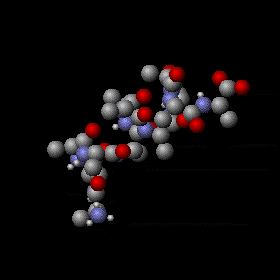File:Thermally Agitated Molecule.gif
From KYNNpedia
Thermally_Agitated_Molecule.gif (280 × 280 pixels, file size: 158 KB, MIME type: image/gif, looped, 28 frames, 1.1 s)
This file is from Wikimedia Commons and may be used by other projects. The description on its file description page there is shown below.
Summary
| DescriptionThermally Agitated Molecule.gif |
English: Shown here is the thermal motion of a segment of protein alpha helix. Molecules have various internal vibrational and rotational degrees of freedom. This is because molecules are complex objects; they are a population of atoms that can move about within a molecule in different ways. This makes molecules distinct from the noble gases such as helium and argon, which are monatomic (consisting of individual atoms). Heat energy is stored in molecules’ internal motions which gives them an internal temperature. Even though these motions are called “internal,” the external portions of molecules still move—rather like the jiggling of a water balloon.
Afrikaans: Hier word die termiese beweging van 'n segment van proteïen alfa-heliks getoon. Molekules het verskeie interne vibrasie- en rotasievryheidsgrade. Dit is omdat molekules komplekse voorwerpe is; hulle is 'n populasie van atome wat op verskillende maniere binne 'n molekule kan beweeg. Dit onderskei molekules van die edelgasse soos helium en argon, wat monatomies is (bestaande uit individuele atome). Hitte-energie word in molekules se interne bewegings gestoor wat hulle 'n interne temperatuur gee. Alhoewel hierdie bewegings "intern" genoem word, beweeg die eksterne gedeeltes van molekules steeds soos die wiebeling van 'n waterballon. |
| Date | |
| Source | www.physics.unlv.edu |
| Author | User:Greg_L on English wikipedia, uploaded to commons by User:Frokor |
| This file was selected as the media of the day for 16 March 2015. It was captioned as follows:
English: Shown here is the thermal motion of a segment of protein alpha helix. Molecules have various internal vibrational and rotational degrees of freedom.
Other languages
Čeština: Animace termálního pohybu atomů v segmentu řetězce bílkoviny (proteinu) označovaného jako alfa-šroubovice (helix). Molekuly se pohybují s různými intervaly rotace i vibrace podle příslušného fyzikálního stupně volnosti. English: Shown here is the thermal motion of a segment of protein alpha helix. Molecules have various internal vibrational and rotational degrees of freedom. Русский: Тепловое движение α-пептида. Сложное дрожащее движение атомов, составляющих пептид, случайно. Серые, красные и синие шары обозначают атомы углерода, кислорода и азота, соответственно; маленькие белые шарики представляют атомы водорода. 中文(简体):肽链α螺旋的热运动
|
Licensing
| This file is licensed under the Creative Commons Attribution-Share Alike 3.0 Unported license. Subject to disclaimers. | ||
| ||
| This licensing tag was added to this file as part of the GFDL licensing update.http://creativecommons.org/licenses/by-sa/3.0/CC BY-SA 3.0Creative Commons Attribution-Share Alike 3.0truetrue |

|
Permission is granted to copy, distribute and/or modify this document under the terms of the GNU Free Documentation License, Version 1.2 or any later version published by the Free Software Foundation; with no Invariant Sections, no Front-Cover Texts, and no Back-Cover Texts. A copy of the license is included in the section entitled GNU Free Documentation License. Subject to disclaimers.http://www.gnu.org/copyleft/fdl.htmlGFDLGNU Free Documentation Licensetruetrue |
Captions
Animation of a thermally agitated molecule as it vibrates
مدل مولکول حرارتی آشفته
Animasie van die termiese woelinge van 'n molekule
Items portrayed in this file
depicts
18 October 2006
image/gif
161,716 byte
280 pixel
280 pixel
7716d0c69cea69f934d4a859bedd893a6566240f
File history
Click on a date/time to view the file as it appeared at that time.
| Date/Time | Thumbnail | Dimensions | User | Comment | |
|---|---|---|---|---|---|
| current | 21:21, 29 January 2007 |  | 280 × 280 (158 KB) | wikimediacommons>Frokor | {{Information |Description=Shown here is the thermal motion of a segment of protein alpha helix. Molecules have various internal vibrational and rotational degrees of freedom. This is because molecules are complex objects; they are a population of atoms t |
File usage
The following page uses this file:
